| Listing 1 - 10 of 12 | << page >> |
Sort by
|
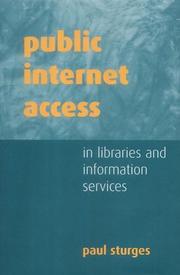
ISBN: 1856044254 Year: 2002 Publisher: London Facet
Abstract | Keywords | Export | Availability | Bookmark
 Loading...
Loading...Choose an application
- Reference Manager
- EndNote
- RefWorks (Direct export to RefWorks)
Computer architecture. Operating systems --- Documentation and information --- Internet access for library users. --- Internet dans les bibliothèques --- Internet access for library users --- 025.5 --- Library Internet access for users --- Public access to the Internet in libraries --- User access to the Internet in libraries --- Library users --- Multimedia library services --- Public access computers in libraries --- Internet dans les bibliothèques

ISBN: 0838908284 0838999182 9780838999189 9780838908280 Year: 2003 Publisher: Chicago American Library Association
Abstract | Keywords | Export | Availability | Bookmark
 Loading...
Loading...Choose an application
- Reference Manager
- EndNote
- RefWorks (Direct export to RefWorks)
Libraries are in the thick of legal issues as new technologies add layers of complexity to everyday work in the library. How do you know what's legal? What can you do to identify and address issues before they turn into bona fide legal matters? Where do you turn for help?. With coverage of all the issues of the day—filters, fair use, copyright, Web publishing and Internet use, software sharing, ADA compliance, free speech, privacy, access, and employment and liability issues—you will have a ''librarian's J.D.'' in short order! Detailed and ready-to-apply answers to more than 600 legal question
Library legislation --- United States --- Internet access for library users --- Law and legislation --- Library Internet access for users --- Public access to the Internet in libraries --- User access to the Internet in libraries --- Library users --- Multimedia library services --- Public access computers in libraries --- Bibliothèques --- Bibliothèques et Internet --- Droit --- États-Unis --- Guides, manuels, etc.
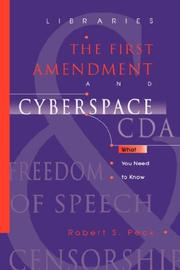
ISBN: 0838999697 9780838999691 0838907733 9780838907733 Year: 2000 Publisher: Chicago, Ill. American Library Association
Abstract | Keywords | Export | Availability | Bookmark
 Loading...
Loading...Choose an application
- Reference Manager
- EndNote
- RefWorks (Direct export to RefWorks)
The First Amendment is inextricably tied up with all kinds of library service, from providing meeting rooms for patrons, to lending materials to children, to giving patrons access to the Internet. Written by the director of the Association of Trial Lawyers of America, Libraries, the First Amendment, and Cyberspace examines how and in what areas the First Amendment affects library decision making and service delivery. With attention to today's electronic environment, Peck's timely and comprehensive book answers the questions librarians most often have about censorship, access, the role of the l
Internet access for library users --- Libraries --- Freedom of speech --- Documentation --- Public institutions --- Librarians --- Library Internet access for users --- Public access to the Internet in libraries --- User access to the Internet in libraries --- Library users --- Multimedia library services --- Public access computers in libraries --- Law and legislation --- Censorship
Book
ISBN: 9781631176661 1631176668 Year: 2014 Publisher: New York
Abstract | Keywords | Export | Availability | Bookmark
 Loading...
Loading...Choose an application
- Reference Manager
- EndNote
- RefWorks (Direct export to RefWorks)
Internet access for library users --- Libraries and the Internet --- Internet and libraries --- Internet --- Library Internet access for users --- Public access to the Internet in libraries --- User access to the Internet in libraries --- Library users --- Multimedia library services --- Public access computers in libraries
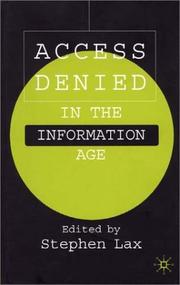
ISBN: 0333920198 Year: 2001 Publisher: Basingstoke Palgrave
Abstract | Keywords | Export | Availability | Bookmark
 Loading...
Loading...Choose an application
- Reference Manager
- EndNote
- RefWorks (Direct export to RefWorks)
Internet --- Internet access for library users --- Communication, International --- Information technology --- -Information society --- #SBIB:309H103 --- Sociology --- Information superhighway --- IT (Information technology) --- Technology --- Telematics --- Knowledge management --- International communication --- World communication --- Communication --- Library Internet access for users --- Public access to the Internet in libraries --- User access to the Internet in libraries --- Library users --- Multimedia library services --- Public access computers in libraries --- Social aspects. --- Social aspects --- Mediatechnologie / ICT / digitale media: sociale en culturele aspecten --- Communication, International. --- Information society. --- Internet access for library users. --- Information society
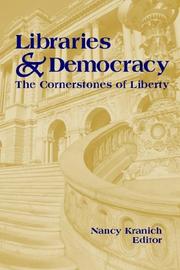
ISBN: 0838998410 0838999190 9780838998410 9780838908082 083890808X Year: 2001 Publisher: Chicago American Library Association
Abstract | Keywords | Export | Availability | Bookmark
 Loading...
Loading...Choose an application
- Reference Manager
- EndNote
- RefWorks (Direct export to RefWorks)
During World War II when the future of democracy was uncertain, Franklin D. Roosevelt described libraries as ''the great symbols of the freedom of the mind,'' ''essential to the functioning of a democratic society.'' Kranich begins this new collection of essays with Roosevelt's sentiment in mind. From Librarian of Congress, James Billington, to founding director of the Center for the Book, John Cole, the leading-edge information specialists of the day share their insights on the role libraries play in advancing democracy. One of the few institutions in the world where people have free access t
Libraries and society --- Libraries and state --- Information policy --- Freedom of information --- Internet access for library users --- Library Internet access for users --- Public access to the Internet in libraries --- User access to the Internet in libraries --- Library users --- Multimedia library services --- Public access computers in libraries --- Society and libraries --- Bibliothèques et société --- Bibliothèques et Etat --- Information --- Liberté d'information --- Internet dans les bibliothèques --- Politique gouvernementale
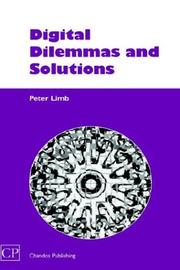
ISBN: 1843340402 1843340399 1780630646 9781780630649 9781843340393 9781843340409 Year: 2004 Volume: *5 Publisher: Oxford, England ; Rollinsford, New Hampshire : Chandos Publishing,
Abstract | Keywords | Export | Availability | Bookmark
 Loading...
Loading...Choose an application
- Reference Manager
- EndNote
- RefWorks (Direct export to RefWorks)
Today, all librarians face daunting challenges posed by trends in technology, publishing, and education as the impact of a globalising information economy forces a rethink of both library strategic directions and everyday library operations. This book brings together the main issues and dilemmas facing libraries; the book clearly shows how to deal with them, and provides a best-practice guide to the solutions.Provides analysis of recent trends and relevant and viable solutions to problems facing all librariansWritten by a highly knowledgeable and well-respected practit
026.068 --- 025.1 --- Software, programmatuur. Elektronische informatiebronnen. Digitale bibliotheken. Virtuele bibliotheken --- Bibliotheek: leiding, directie. Bibliotheekorganisatie. Bibliotheekmanagement --- 025.1 Bibliotheek: leiding, directie. Bibliotheekorganisatie. Bibliotheekmanagement --- 026.068 Software, programmatuur. Elektronische informatiebronnen. Digitale bibliotheken. Virtuele bibliotheken --- Libraries --- Information technology --- Library materials --- Digitization --- Libraries and the Internet. --- Internet access for library users. --- Internet. --- DARPA Internet --- Internet (Computer network) --- Wide area networks (Computer networks) --- World Wide Web --- Library Internet access for users --- Public access to the Internet in libraries --- User access to the Internet in libraries --- Library users --- Multimedia library services --- Public access computers in libraries --- Internet and libraries --- Internet --- Libraries and the Internet --- Electronic information resources --- Bibliothèques et Internet --- Sources d'information électroniques
Book
ISBN: 9783110258820 311025882X Year: 2011 Volume: 45 Publisher: Berlin de Gruyter
Abstract | Keywords | Export | Availability | Bookmark
 Loading...
Loading...Choose an application
- Reference Manager
- EndNote
- RefWorks (Direct export to RefWorks)
Internet access for library users --- Electronic information resource searching. --- Digital libraries. --- 025 --- Bibliotheekbeheer --- 025 Bibliotheekbeheer --- Digital libraries --- Electronic information resource searching --- Library Internet access for users --- Public access to the Internet in libraries --- User access to the Internet in libraries --- Library users --- Multimedia library services --- Public access computers in libraries --- Computer searching --- Electronic searching --- Online searching --- Searching electronic information resources --- Information retrieval --- Digital curation --- Digital media collections --- Digital media libraries --- Digital repositories --- Electronic libraries --- Electronic publication collections --- Electronic publication libraries --- Electronic text collections --- Repositories, Digital --- Virtual libraries --- Libraries --- Information storage and retrieval systems --- Web archives
Book
ISBN: 1441619232 0838997120 9781441619235 9780838935767 Year: 2009 Publisher: Chicago American Library Association
Abstract | Keywords | Export | Availability | Bookmark
 Loading...
Loading...Choose an application
- Reference Manager
- EndNote
- RefWorks (Direct export to RefWorks)
The Internet is not a one-way street in terms of library service as it challenges any traditional notion of its use for collecting or managing information. In this resource authors Charles McClure and Paul T. Jaeger speak to the ways in which the Internet has had more impact on public libraries than any other technology since the creation of the book.
Internet access for library users -- United States. --- Libraries and society -- United States. --- Libraries and the Internet -- United States. --- Public libraries -- Aims and objectives -- United States. --- Public libraries -- Social aspects -- United States. --- Libraries and the Internet --- Internet access for library users --- Public libraries --- Libraries and society --- Social Sciences --- Library & Information Science --- Society and libraries --- Library Internet access for users --- Public access to the Internet in libraries --- User access to the Internet in libraries --- Library users --- Multimedia library services --- Public access computers in libraries --- Internet and libraries --- Internet --- Aims and objectives --- Social aspects
Book
ISBN: 9781631176326 1631176323 Year: 2014 Publisher: New York : Nova Publishers,
Abstract | Keywords | Export | Availability | Bookmark
 Loading...
Loading...Choose an application
- Reference Manager
- EndNote
- RefWorks (Direct export to RefWorks)
Digital divide --- Digital communications --- Communication and technology --- Public access computers in libraries --- Internet access for library users --- Consumer education --- Internet --- Broadband communication systems --- Wideband communication systems --- Telecommunication systems --- Buyers' guides --- Shoppers' guides --- Consumer affairs departments --- Consumers' leagues --- Education --- Home economics --- Shopping --- Library Internet access for users --- Public access to the Internet in libraries --- User access to the Internet in libraries --- Library users --- Multimedia library services --- Computers in libraries, Public access --- Library public access computers --- Public services (Libraries) --- Technology and communication --- Technology --- Communications, Digital --- Digital transmission --- Pulse communication --- Digital electronics --- Pulse techniques (Electronics) --- Telecommunication --- Digital media --- Signal processing --- Government policy --- Finance --- Digital techniques --- E-books --- Digital communications. --- Communication and technology. --- Public access computers in libraries. --- Internet access for library users.
| Listing 1 - 10 of 12 | << page >> |
Sort by
|

 Search
Search Feedback
Feedback About UniCat
About UniCat  Help
Help News
News